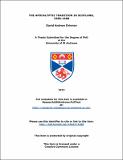Files in this item
The apocalyptic tradition in Scotland, 1588-1688
Item metadata
| dc.contributor.advisor | Mason, Roger A. | |
| dc.contributor.advisor | Tapsell, Grant | |
| dc.contributor.author | Drinnon, David A. | |
| dc.coverage.spatial | 231 | en_US |
| dc.date.accessioned | 2013-03-13T12:06:57Z | |
| dc.date.available | 2013-03-13T12:06:57Z | |
| dc.date.issued | 2013-06 | |
| dc.identifier.uri | https://hdl.handle.net/10023/3386 | |
| dc.description.abstract | Throughout the seventeenth century, numerous Scots became convinced that the major political and religious upheavals of their age signified the fulfillment of, or further unfolding of, the vivid prophecies described in the Book of Revelation which foretell of the final consummation of all things. To date, however, an in-depth analysis of the evolution of Scottish apocalyptic belief during the seventeenth century has never been undertaken. This thesis utilizes a wide variety of source material to demonstrate the existence of a cohesive, persistent, and largely conservative tradition of apocalyptic thought in Scotland that spanned the years 1588 to 1688. Chapter One examines several influential commentaries on the Book of Revelation published by notable Scots during the decades either side of the Union of Crowns. These works reveal many of the principal characteristics that formed the basis of the Scottish apocalyptic tradition. The most important of these traits which became a consistent feature of the tradition was the rejection of millenarianism. In recent years, historians have exaggerated the influence of millenarian ideals in Scotland during the Covenanting movement which began in 1638. Chapter Two argues that Scottish Covenanters consistently denounced millenarianism as a dangerous, subversive doctrine that could lead to the religious radicalism espoused by sixteenth-century German Anabaptists. Chapter Three looks at political and religious factors which led to the general decline of apocalyptic expectancy in Scotland during the Interregnum. It also demonstrates how, despite this decline, Scottish apocalyptic thinkers continued to uphold the primary traits of the apocalyptic tradition which surfaced over the first half of the century. Lastly, Chapter Four explains how state-enforced religious persecution of Scottish Presbyterians during the Restoration period led to the radicalisation of the tradition and inspired the violent actions of Covenanter extremists who believed they had been chosen by God to act as instruments of his divine vengeance in the latter-days. | en_US |
| dc.language.iso | en | en_US |
| dc.publisher | University of St Andrews | |
| dc.rights | Creative Commons Attribution-NonCommercial-NoDerivs 3.0 Unported | |
| dc.rights.uri | http://creativecommons.org/licenses/by-nc-nd/3.0/ | |
| dc.subject | Apocalypticism | en_US |
| dc.subject | Apocalyptic | en_US |
| dc.subject | Millenarianism | en_US |
| dc.subject | Millennialism | en_US |
| dc.subject | Covenanter | en_US |
| dc.subject | Last Judgment | en_US |
| dc.subject | Prophecy | en_US |
| dc.subject | Prophetic | en_US |
| dc.subject | Last days | en_US |
| dc.subject | Antichrist | en_US |
| dc.subject | Revelation | en_US |
| dc.subject | John Napier | en_US |
| dc.subject | James Durham | en_US |
| dc.subject | Eschatology | en_US |
| dc.subject | Millennium | en_US |
| dc.subject | Eisegesis | en_US |
| dc.subject.lcc | BR785.D85 | |
| dc.subject.lcsh | Scotland--Religion--17th century | en_US |
| dc.subject.lcsh | End of the world | en_US |
| dc.subject.lcsh | Millennialism--Scotland--History--17th century | en_US |
| dc.subject.lcsh | Bible. N.T. Revelation--Commentaries--Early works to 1800 | en_US |
| dc.subject.lcsh | Apocalyptic literature--Early works to 1800 | en_US |
| dc.subject.lcsh | Church history--Scotland--17th century | en_US |
| dc.title | The apocalyptic tradition in Scotland, 1588-1688 | en_US |
| dc.type | Thesis | en_US |
| dc.type.qualificationlevel | Doctoral | en_US |
| dc.type.qualificationname | PhD Doctor of Philosophy | en_US |
| dc.publisher.institution | The University of St Andrews | en_US |
This item appears in the following Collection(s)
Except where otherwise noted within the work, this item's licence for re-use is described as Creative Commons Attribution-NonCommercial-NoDerivs 3.0 Unported
Items in the St Andrews Research Repository are protected by copyright, with all rights reserved, unless otherwise indicated.


